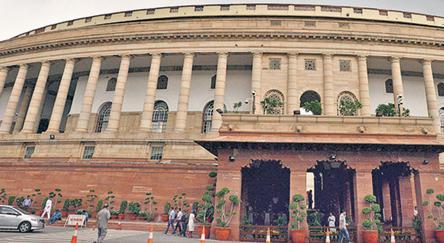Parliament Session: Govt Continues to Undermine Criticism of New Laws

Representational Image. Image Courtesy: Hindustan Times
In the first session of the ongoing 17th Lok Sabha, the National Democratic Alliance (NDA) has already signalled its stance when it comes to legislations – nudge aside concerns raised by opposition or civil societies on crucial bills only to further the ruling party’s agenda, as was the case during the previous term.
According to PRS legislative research, during the 16th Lok Sabha, 133 Bills were passed and 45 Ordinances were promulgated, many of which were also re-promulgated despite a Supreme Court ruling which held the practice as a fraud on the Constitution. Also, a significantly lower proportion of bills are sent to committees for scrutiny, that is only 25% of the bills introduced were referred to committees, much lower than 71% and 60% in the 15th and 14th Lok Sabha respectively.
A quick look at the controversies surrounding a set of bills – the Aadhaar and Other Laws (Amendment) Bill, 2019, the Right to Information (Amendment) Bill, 2019 and the Protection of Human Rights (Amendment) Bill, 2019, introduced or passed in the current session helps one understand how the central government overlooked the concerns raised by both opposition and the people in general.
During this parliamentary session, both the Lok Sabha and the Rajya Sabha passed the Aadhaar and Other Laws (Amendment) Bill, 2019, which was previously promulgated as an ordinance. While the bill makes changes in the original Aadhar Act, 2016, the rights activists and opposition leaders have claimed that the move intends to override a Supreme Court decision that struck down parts of the original act, including Section 57 that allowed non-government or private entities access to the identity database. While the apex court categorically declared that no person shall be denied services for lack of Aadhaar, in contrast, Section 5 of the amendment bill enables Parliament to make Aadhaar mandatory for authentication by enacting a subsequent law. In simple words, the government continued its stand to not to address long standing concerns related to Aadhar.
On July 19, the Lok Sabha passed the Protection of Human Rights (Amendment) Bill, 2019 amid strong demand from the opposition for a fresh bill. The amendment bill deals various matters relating National Human Rights Commission (NHRC), State Human Rights Commission (SHRC), and Human Rights Courts. Major contention on the bill has been that it doesn’t comprehensively safeguard the rights of activists.
Congress MP Shashi Tharoor claimed that the Bill was “piecemeal and cosmetic” while pointing out the human rights violations in the detention tribunals in Assam over the National Register of Citizens. He claimed that as many as 57 people committed suicide who failed to produce citizenship documents during the NRC drive. Tharoor said in Lok Sabha that it was ironic as the bill was brought at a time when human rights activists including Indira Jaising and Anand Grover were being “stifled” and legal activist Sudha Bharadwaj was under arrest.
On July 19, Minister of State for Personnel, Public Grievances and Pensions, Jitendra Singh, introduced the Right to Information (Amendment) Bill, 2019 that seeks to amend the Right to Information Act, 2005. The opposition leaders have challenged the introduction of the bill, but were overruled. While TMC’s Saugata Roy demanded that the bill be sent to a standing committee before introduction, AIMIM’s Asaduddin Owaisi called for voting for the introduction.
As the voting happened through colour-coded paper ballot way, 224 members supported the introduction and nine opposed it. Almost the entire opposition including the Congress, Trinamool Congress and Dravida Munnetra Kazhagam (DMK) walked out during the vote.
The major criticism against the bill is that it seeks to amend several provisions to state that the salaries, allowances, and other terms and conditions of service of the central and state Central Information Commissioners (CICs) and Information Commissioners (ICs) will be determined by the central government.
Several activists and former CICs have been arguing that the amendment would take away the independence of the commissions. “This (amendment) has dangerous implications. The whole edifice of the RTI's implementation stands on the way the information commission deals with it. The independent interpretation of the RTI Act is possible only with its independence from the executive,” says Sridhar Acharyulu, who served as the CIC during 2013-2018.
Get the latest reports & analysis with people's perspective on Protests, movements & deep analytical videos, discussions of the current affairs in your Telegram app. Subscribe to NewsClick's Telegram channel & get Real-Time updates on stories, as they get published on our website.
























